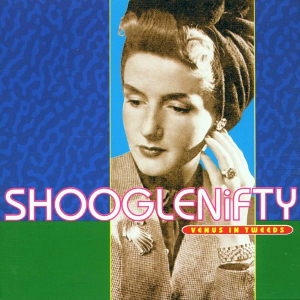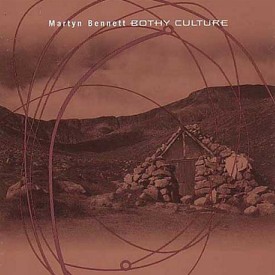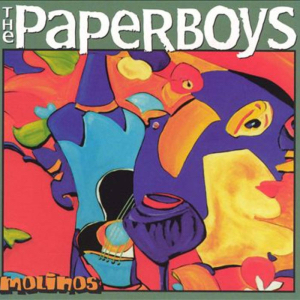
Richard Peter Gaughan is a Scottish musician, singer and songwriter, particularly of folk and social protest songs. He is regarded as one of Scotland's leading singer-songwriters.

The Peatbog Faeries are a largely instrumental Celtic fusion band. Formed in 1991, they are based in Dunvegan on the Isle of Skye, Scotland.

Shooglenifty are a Scottish, Edinburgh-based six-piece Celtic fusion band that tours internationally. The band blends Scottish traditional music with influences ranging from electronica to alternative rock. They contributed to Afro Celt Sound System's 1996 album Volume 1: Sound Magic. The band have performed in countries including Australia, Austria, Cuba, Belgium, France, Norway, Ireland, Italy, Denmark, New Zealand, Indonesia, South Africa, Lebanon, Spain, the US, Canada, Malaysia, Singapore, Japan, India, Germany, Sweden, the Netherlands, Russia, Luxembourg, Hungary, the Czech Republic, Slovakia, Slovenia, Poland, Switzerland, Portugal, Mexico and the UK. They have performed for a number of notable fans, including Prince Charles, Tony Blair, Nelson Mandela, and Emperor Akihito of Japan.

Venus in Tweeds, an album by Shooglenifty, was released in 1995 on the Greentrax Recordings label.

Solar Shears is the third studio album and fourth album overall by Scottish Celtic fusion band Shooglenifty. After the critical acclaim given to their underground second album A Whisky Kiss (1996), the band left Greentrax Recordings and signed to Vertical Records in the UK and Compass Records in the US and hired long time producer Jim Sutherland to produce their new album. The album sees the band expand their self-described "acid croft" sound, featuring a wide range of musical influences such as worldbeat, Eastern music, African music, psychedelic music, bluegrass, breakbeat and techno fused with a traditional Scottish Celtic music sound. With this album, Sutherland introduced many unorthodox approaches to the band's music, including looped beats, scratching, electro-atmospherics and sampled 'discovered sounds' from industrial clanks and rumbles to snatches of telephone conversation and recorded pelican crossing announcements.

Jennifer and Hazel Wrigley are an international folk music duo playing fiddle (Jennifer) and guitar/piano (Hazel). They are twin sisters, born 16 August 1974, who grew up in Orkney, Scotland. They started to play when given instruments on their 8th birthday and soon joined the Orkney Strathspey and Reel Society in Kirkwall. In their early teens they were playing, often with their older sister Emma on accordion, at local concerts and ceilidhs around Orkney. There they were spotted by Orkney's only recording studio who launched them into Dancing Fingers, their first album, recorded between the ages of 13 and 16 years and released in 1991 when they were 16 years old.
Mouth Music is a Scottish-inspired musical project founded in 1988, whose combination of traditional Gaelic songs and music with contemporary instrumental and technological settings led them to international fame in the early 1990s.

Malinky is a Scottish folk band specialising in Scots song, formed in autumn 1998.

Mellowosity is the debut studio album by Scottish Celtic fusion group Peatbog Faeries, released in 1996 on Greentrax Recordings. After forming as a vocal-based Celtic rock group in 1994, the duo had settled into becoming an instrumental Celtic fusion group by the release of Mellowosity. The album draws from a wide range of musical styles and influences including jazz, reggae, afrobeat, rock, Eastern music, dub and funk, that are mixed in with the band's traditional Scottish folk/Celtic sound featuring fiddles and bagpipes.

Faerie Stories is the second album by Scottish Celtic fusion group Peatbog Faeries, released in 2001 on Greentrax Recordings. The album was reissued in 2008 as a digipack. The album is large departure from the sound of their début album Mellowosity (1996), and sees the band explore a largely electronic sound mixed with their traditional Celtic fusion sound. Influences of electronic genres such as electronica, house, dubtronica and trip hop, in addition to even dub music and African music can be heard on the album fused with traditional Scottish Celtic music.

Welcome to Dun Vegas is the third album by Scottish Celtic fusion group Peatbog Faeries, released in July 2003 as the first release on the band's own Peatbog Records label. The album was recorded in a cottage on the banks of Pool Roag, near Dunvegan, on the Isle of Skye. Following the electronic-infused Faerie Stories (2001), Dun Vegas was co-produced between Calum MacLean and the band's drummer Iain Copeland. The album is experimental, mixing traditional and modern Celtic music with other genres and styles such as African music and electronica and featuring experimental effects including backwards drumming and a track based around a kitchen cooker timer.

Croftwork is the fourth album by Scottish Celtic fusion group Peatbog Faeries, recorded in Roag on the Isle of Skye, and released in 2005 on the band's own Peatbog Records label. It was released as the label's second album following on from the band's previous album Welcome to Dun Vegas (2003). They recorded the album at Phat Controller Productions on the band's native Isle of Skye.

Redwood is an album by Lúnasa that was released in 2003 on Green Linnet Records. It was their fourth major release, and their last album on Green Linnet Records. The band conceived the album in October 2001 whilst staying in a Californian lodge; the band aimed to record an album that would capture the band's live feel whilst at the same time retaining the sonic quality that the band feature on their albums. The band took a ten-day break from their February 2002 American tour to record the album at Prairie Sun Recording Studios in California. It is characterised by a more relaxed sound than previous albums, and less guest musicians.

Bothy Culture is the second studio album by the Scottish Celtic fusion artist Martyn Bennett, released in January 1998 on the Rykodisc label. After winning critical acclaim for his debut album Martyn Bennett (1996), Bothy Culture builds upon that album's mixing of Scottish Celtic music with farther, international folk music styles and contemporary electronic music. The album celebrates and draws upon the music of Bennett's native Gaeldom as well as the music of Islam and Scandinavia, with Bennett finding and emotionally connecting to the similarities between the geographically dispersed styles. It mixes the styles with contemporary electronic music such as breakbeat and drum and bass.

Seven is the fifth studio album by the Scottish Celtic rock band Wolfstone. After the release of the band's previous album The Half Tail in 1996, numerous members left the band, and due to poor management, the band "split up" in 1998 after the band's label Green Linnet Records released an unrelated side-project as the Wolfstone album This Strange Place in early 1998. However, still contractually obliged to record another album for Green Linnet Records, the remaining members of the band regrouped chose to write and record the required album with full attention, rather than make a "half-hearted" album. Bassist Wayne Mackenzie said "we could have just gone through the motions and made a half-hearted attempt at an album, but we didn’t. The band and our fans mean far too much to us to do that." Titling the album Seven after where the album sits in the band's canonical album sequence, the album style was described as a particularly rock-edged variation of Celtic rock, although it does feature some mellower tracks. The album contains a mix between songs and instrumentals and diverse subject matter.

Molinos is the third studio album by Canadian worldbeat/Celtic rock band The Paperboys. After the success of their second album Late as Usual (1994), Neill Burnett and Moritz Behm left the band and were replaced by Shannon Saunders and Shona LeMotte, both of whom came from musical families and had been steeped in Celtic and bluegrass traditions for years. After a tour of the United States, flutist Hanz Araki joined the band in 1996. The new members of the band drew the band into an increasingly world music-based direction, and began work on Molinos shortly afterwards.
Martin Swan is a Scottish multi-instrumentalist, songwriter, composer, record producer, recording engineer and instrument designer.
Fiddlers' Bid are a Shetland based instrumental group known for playing contemporary arrangements of traditional Shetland fiddle tunes. The seven piece line-up consists of four fiddles, acoustic guitar, bass guitar and piano/Clàrsach.
Mairi Campbell is a Scottish folk singer and musician. Campbell's songs and music have a rooted and powerful quality that range from the everyday to the universal, both in sound and subject matter.

The Fiddle Collection is a studio album with tracks from various British fiddle players produced by Phil Beer. Released in 1999, it was Beer's first solo project of the year during his temporary break from Show of Hands. Promoted with the tagline "this really is modern folk music", it featured fifteen different, original tracks by different UK violin-playing folk musicians, and was designed to represent the fiddle and folk scene in the United Kingdom.

















